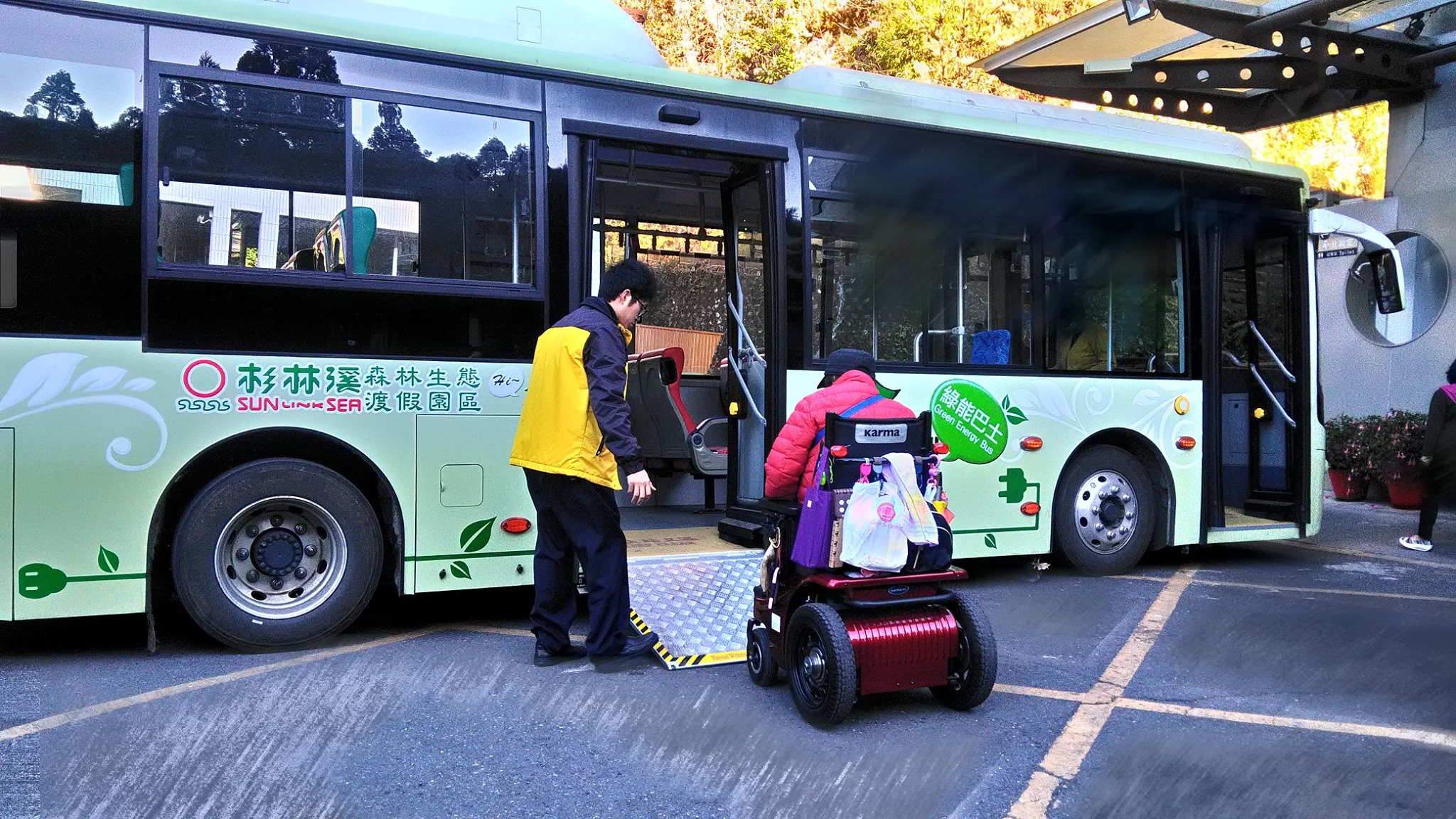Reporters/Li-yu Yeh, Hsin-tong Yu
Traveling for a holiday, sightseeing, and immersing oneself in nature is always an enriching and refreshing experience. However, traveling can present many challenges. For people with disabilities, it can present more hurdles than the ones able-bodied people typically experience. The reality is that the infrastructure and transit systems in most countries are not designed to meet the needs of people with limited mobility, which presents various challenges and can make it difficult to explore new places.
Xsin-yi Huang, the first wheelchair-tour guide in Taiwan, had her first stroke at the age of 27, and suffered from lupus erythematosus at the age of 29, causing paralysis of her lower limbs. However, Huang isn’t limited by her wheelchair, as she encourages the disabled or people who are physically challenged to step out of their homes and go into nature.
As to why she decided to become a wheelchair tour guide, Huang said that the lack of information in Taiwan has caused many people with physical disabilities to think that the outside world is unfriendly to people with mobility impairments, who may harbor thoughts such as, “Am I not able to go anywhere?” Yet, after Huang modified her own car and was accompanied by her caregiver, she was able to travel around the island and came to a realization that the outside world was not as bad as she thought.
At first, Huang shared the places she visited in a wheelchair on her blog and Facebook, but later, she learned that not all people with disabilities and limited mobility are able to go there by themselves. So, she tried to plan trip itineraries for them. But she often faced the problem of insufficient funds to organize tours for these people.
In the end, Huang chose to obtain a tour guide license, so that she could take people with disabilities on tours. She admitted that the biggest difference between being a wheelchair tour guide and an ordinary tour guide is that the work of the former is much more demanding. For one thing, she has to go to the venues and do some research to find out whether the environment of the scenic spots or restaurants is good for her clients or not.
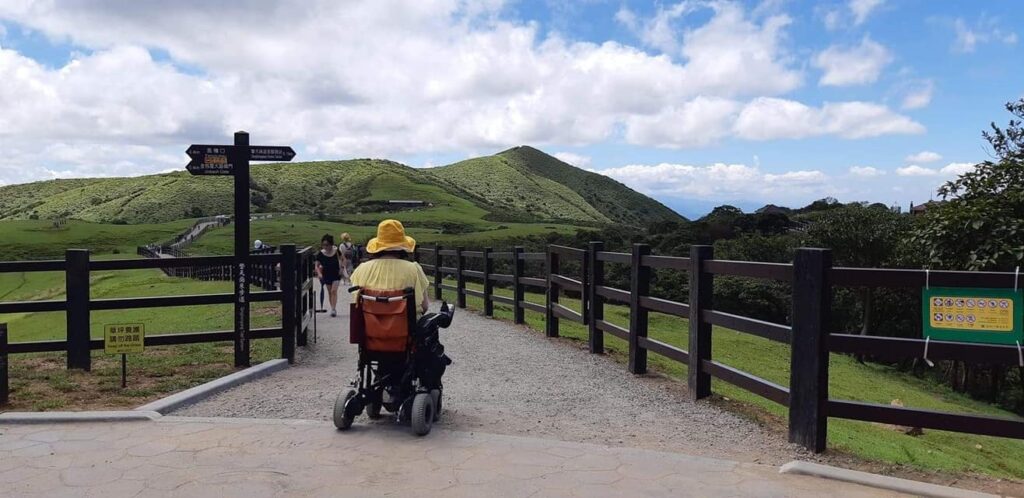
Huang cited an example by saying, “Outside the Zhushan Fire Station in Alishan, there were 70 or 80 flights of stairs, but after we sought help from the Forestry Bureau, the stairs were changed to a ramp so that people with disabilities could climb up to the sunrise viewing platform in wheelchairs. The park also opened reservations for vehicles of people with disabilities to enter the park.”
Nevertheless, Huang added that for physically challenged tourists, there are still many hurdles in transportation and accommodation, such as the lack of seats for physically challenged people in tour buses, the lack of barrier-free or accessible rooms in hotels, and the small number of barrier-free or accessible toilets in outdoor areas. “Usually, there is only one barrier-free toilet in the recreational parks. But since we went out in a group with more than ten wheelchairs, you could imagine how much time we need to spend to take turns in going to the restrooms,” Huang said.
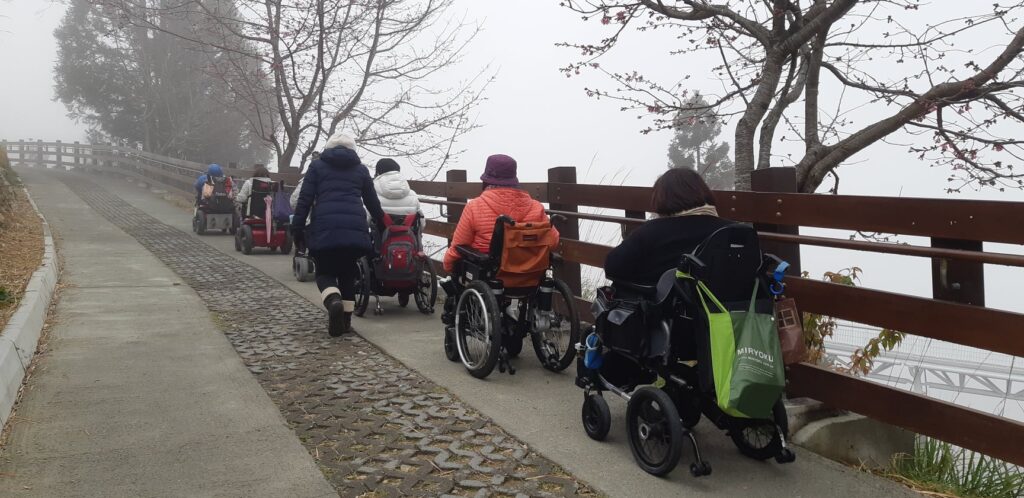
Huang also pointed out that the universal design of the facilities should be improved. If the bathroom door of the general hotel room are wide enough and all users are taken into consideration, it is not a problem for the physically challenged to stay in the general room type.
Huang reluctantly said, “Isn’t it ridiculous to be able to go in and out of the room’s door and lie on the bed where you are staying, but you simply can’t enter the bathroom?” Therefore, Huang hoped that the barrier-free or accessible environment in Taiwan could be improved in the future, and that transportation and accommodation could be more convenient for this group of people.
Accessible facilities for the disabled
Jin-lan Zhuang, who has been in a wheelchair for nearly 15 years, said that although there could be a barrier-free space advertised in a restaurant or a restroom, her wheelchair actually cannot enter, thus, these places cause a lot of inconvenience for people like her.
In terms of transportation, Zhuang said that it is not convenient for disabled people to use. Currently, there are more than 300 rehabilitation buses in Taipei City, but they are still not enough for the disabled. She said frankly that many people with disabilities are actually reluctant to take the buses since they need to take more time to get on and off the bus. Also, most bus drivers will give them the cold shoulder. Among other things, the bus is usually crowded and unsafe, thus , some of her disabled friends have even fallen on the buses.
“Japan is very friendly to people with disabilities,” Zhuang shared her story of traveling to Japan many years ago. She even went to Kurobe, Tateyama, located at a high altitude. Yet, she could still find accessible restrooms there, which shows the Japanese’s concerns for people with disabilities. She believed that if the facilities are improved in Taiwan , more disabled people will be willing to join the tours.
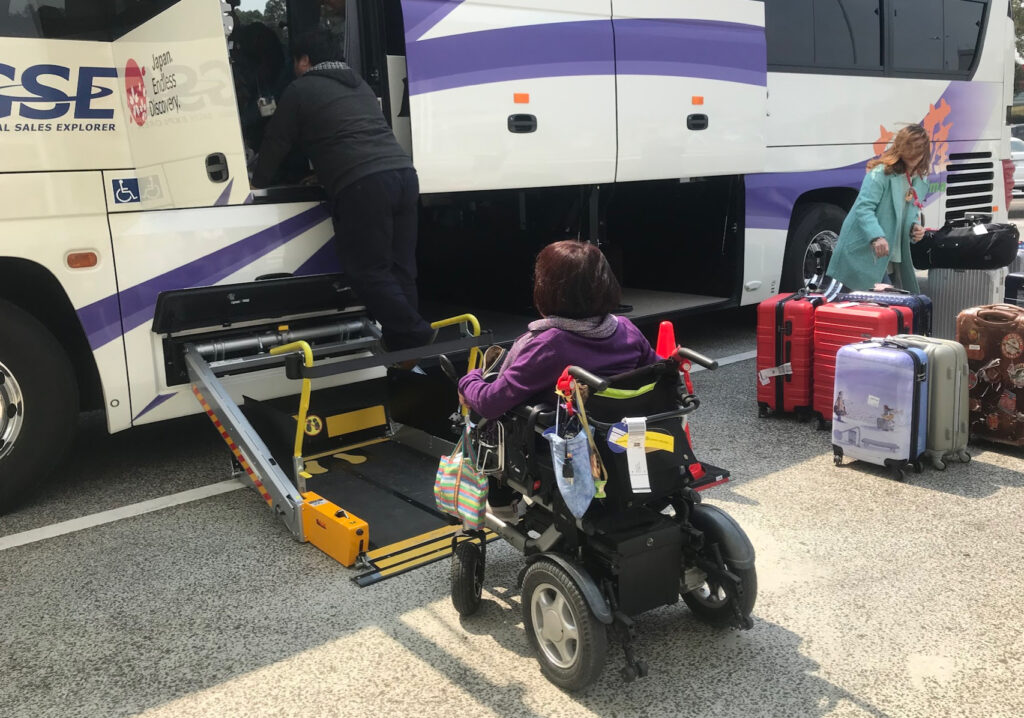
Duofu Holidays is a travel agency that started out with rehabilitation bus transfers, mainly focusing on ” offering barrier-free transfer services.” It is totally committed to providing good transportation services to people with disabilities and the elderly population. With a lot of barrier-free transfer experiences, the travel agency started to provide customized travel tours and butler escort services for the disabled as well.
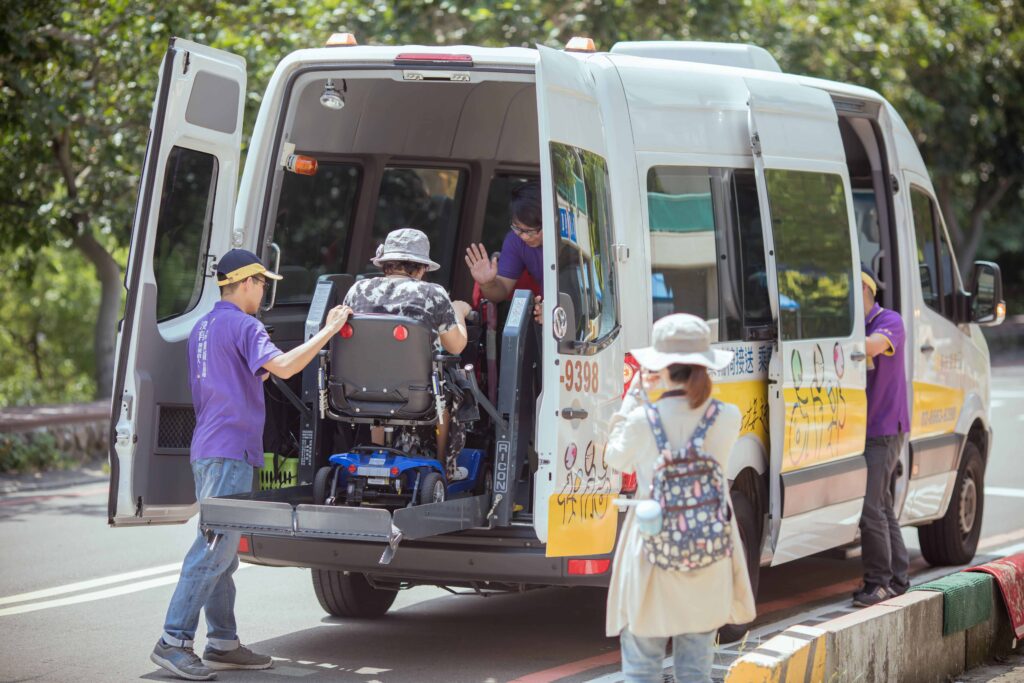
Yi-zhong Liu, deputy general manager of Duofu Holidays, said that when arranging barrier-free tours, time and barrier-free enviroments are her most important considerations. Moreover, she mentioned that since it takes more time for people with disabilities to get on and off the bus, time management is important. Finding useable barrier-free or accessible spaces available in the recreational places is the top priority for the travel agency.
“Unfriendly environments for the disabled are found everywhere,” Liu sighed. She took Taiwan’s high-speed rail as an example. The high-speed rail has 12 carriages with more than 900 seats, but it has only 4 barrier-free seats. Besides the unfriendly environment , she also mentioned that people’s reactions towards the disabled often injured their pride. “Some people think that encountering people in a wheelchair is ominous ,” Liu added.
Regrettably, most people don’t understand the importance of barrier-free or accessible environment for the wheelchaired people. Liu stated that if there are more barrier-free environments, people with disabilities will have the incentives to go out and enjoy outdoor excursions.
Barrier-free improvements
Yu-ru Wang, deputy director of The League for Persons with Disabilities, R.O.C., said that Taiwan railways are a lot friendlier to people with disabilities as compared to Taiwan’s high-speed rail, because the design of the Taiwan railways and the MRT are similar, with the width of the doors larger than in Taiwan high-speed rail. Thus, even if there are no barrier-free seats in each car, there is enough space for wheelchairs to park. In addition, the station services make it easy for the disabled to get on and off the carriage.
In terms of accommodation, according to the design specifications of accessible and usable buildings and facilities stipulated by the Architecture and Building Research Institute, Ministry of the Interior, ” new hotels with more than sixteen rooms must be equipped with more than one barrier-free room. As for old hotels with more than 50 rooms, they must also be equipped with one or more accessible rooms,” Wang said.
Wang commented that there will always be hotel owners who think that if they spend money on renovations, they won’t be making much profits. Coupled with the impact of the pandemic, it is difficult to motivate the hotel industry to do the renovations unless there are incentives and subsidies from the Tourism Bureau, Ministry of Transportation and Communications.
Since the disabled include the visually impaired, and hearing impaired, Wang suggested that in the case of hotel’s limited budget, purchasing flashing alarms, vibrating alarm clocks, or designing communication cards will certainly provide a better environment for these physically challenged people who deserve extra care.
Hopefully, more tour companies will be set up in Taiwan to provide the disabled with meticulous planning and safe trips. With barrier-free or accessible environments and easy access to travel, the physically-challenged people will be able to enjoy safe and fun trips just like able-bodied people.

